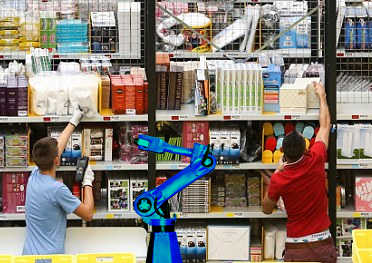| Amazon Robot Picking Challenge 2015 |
| Written by Alex Armstrong | |||
| Thursday, 09 October 2014 | |||
|
Amazon has lots and lots of warehouses, sorry fulfilment centers, all over the world and they employ lots of humans to find the stuff you buy. The Amazon Picking Challenge is about getting robots to do the same job. Amazon's fulfilment centers are already interesting from the point of view of computer science. For example, they use a hashing system to place things on shelves. You don't have to search for something alphabetically, you simply compute its hash function and this is the address of the shelf it is sitting on. In March 2012 Amazon also bought a company that makes warehouse robots, Kiva Systems. These make small trucks which turn shelving into something more mobile. In this case the trucks move any shelf with everything it is storing to a location that needs it - either to load it with new items or to obtain items that have been ordered. See the video to get the full impact of the idea:
However, for all this automation Amazon still uses human's, pickers, to actually go to the location on a shelf and take one, or however many, of whatever it is you ordered and put the items in a tray on another automatic shelf. Why? Because despite it being a seemingly menial job it actually needs all those human senses and effectors that we take for granted. A machine just isn't up to it - or is it?
The Picking Challenge at ICRA (IEEE Robotics and Automation) 2015 is about getting a robot to perform the picking task. "This competition will challenge entrants to build their own robot hardware and software that can attempt simplified versions of the general task of picking items from shelves. The robots will be presented with a stationary lightly populated inventory shelf and be asked to pick a subset of the products and put them on a table. The challenge combines object recognition, pose recognition, grasp planning, compliant manipulation, motion planning, task planning, task execution, and error detection and recovery. The robots will be scored by how many items are picked in a fixed amount of time, with $26,000 in prizes being awarded. Participants will be encouraged to share and disseminate their approach to improve future challenge results and industrial implementations." The prizes are actually $20,000 for the winner, $5000 for second place and $1000 for third place. In addition each team can be awarded up to $6000 to get them and their robot to the conference so that they can participate in the challenge. Amazon is even offering to try to act as matchmaker between robot companies and teams not having the robot hardware they need. A Baxter Research Robot will be made available at the contest. The competitors will get a JSON file listing the items in the bins and the work order listing the items that need to be picked. The robots don't have to be humanoid but they do have to autonomous. It appears to be a good competition and judging by the enthusiasm that Amazon seems to have it might well be the start of a regular event. It also seems to be organized in an open way that should stimulate research. It does, however, highlight many of the dilemmas facing robot researchers. It has been highlighted many times what difficult working conditions Amazon pickers have to put up with. In summer it's too hot and in winter the warehouse can be freezing. The work is tedious, repetitive, strictly controlled and is poorly paid. In Germany there is currently a strike over pay and there are lots of stories of poor treatment of workers. A robot picker sounds like it could be removing humans from a job that would be much better suited to robots - but then of course, the humans wouldn't have jobs. We talk a lot in the abstract about the effect that robots have on employment and are very smug about the idea that robots grow the overall job market by creating new jobs, but here we have a crystal clear situation. The people doing the picking aren't going to be getting jobs that have been created by the robots. The robots will simply take their jobs.
More InformationRelated ArticlesRodney Brooks And Why Robots Will Be Essential Baxter Is A Useful Robot - Sort Of Rodney Brooks On Robotics And Baxter Robot & Frank - A Vision of the Future?
To be informed about new articles on I Programmer, install the I Programmer Toolbar, subscribe to the RSS feed, follow us on, Twitter, Facebook, Google+ or Linkedin, or sign up for our weekly newsletter.
Comments
or email your comment to: comments@i-programmer.info
|
|||
| Last Updated ( Thursday, 09 October 2014 ) |



